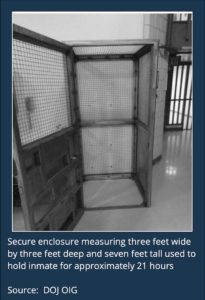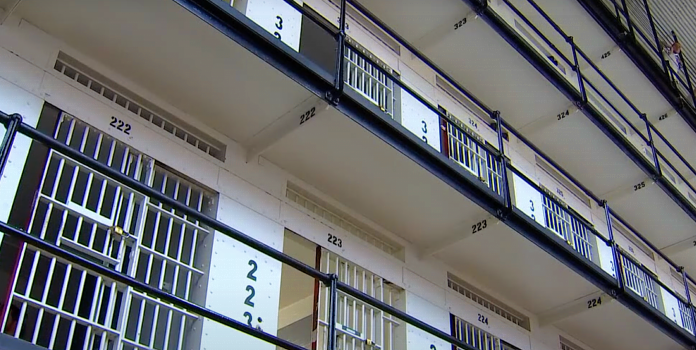(Ken Silva, Headline USA) The Bureau of Prisons is apparently throwing inmates in 3-feet-wide by 3-feet-long cages for hours on end, according to a recent report from the Justice Department’s Office of the Inspector General.
In a report released earlier this month, DOJ IG Michael Horowitz found that in one instance, an inmate was held in the cage for 21 hours.
Horowitz said the inmate was initially put in the cage so that his cell could be searched. The inmate remained in the cage after the search because he refused to be handcuffed.
“For approximately eight hours, the inmate stood in the secure enclosure, which did not contain a chair or any furnishings. The inmate then agreed to be handcuffed in order to receive a chair and be taken to the bathroom,” Horowitz said.
“After the inmate used the bathroom, staff returned the inmate to the secure enclosure, with a chair, rather than his standard cell due to miscommunication or lack of communication among BOP officials. The inmate then remained in the holding cage with a chair for an additional twelve hours,” he said.
“At one point during those twelve hours, the chair was removed. In addition, while the inmate may have been offered the opportunity to be handcuffed to use the bathroom again, he did not use the bathroom during the final twelve hours in the secure enclosure.”
When questioned about the incident, the BOP reportedly told the DOJ IG that the cages are not intended for prolong confinement.
However, prisons officials admitted that they have no official policy on the matter. Horowitz warned that without a policy, officials might throw inmates into cages for as long as they want.
Horowitz recommended that the BOP draft policies on the use of cages for temporary confinement.
“Additionally, BOP policy does not state whether the use of a three feet wide by three feet deep and seven feet tall secure enclosure as a temporary holding facility is considered a restraint given that an inmate who is confined in this way is subjected to extremely limited movement and other potential liberty deprivations,” the IG added.
“If such secure enclosures are not considered a restraint, an inmate so confined would not be protected by any safeguards in BOP regulations regarding the use of restraints, such as periodic examination by Psychology Services or medical staff.”
The BOP agreed with Horowtiz’s recommendations and promised to draft a policy regarding the use of cages. Prisons Director Colette Peters told Horowitz that his report on the inmate confined for 21 hours “galvanized BOP’s efforts to prevent issues in the future.”
However, Peters said the BOP doesn’t consider cages to be a “restraint”—implying that the BOP will not follow the IG’s suggestion to have caged inmates receive medical staff examinations.
In a footnote of the report, Horowitz said the BOP took exception to the term “cage.”
“The BOP preferred to refer to the secure enclosures as ‘temporary holding cells,’” he said.
The use of cages is one of the many horrors of federal prison. In the ongoing Headline USA investigative series, the Fed Files, this publication unearthed a shocking doctor’s report about an inmate that had been subjected to severe torture in solitary confinement.
“In 2014, while Mr. White was incarcerated at the John C. Polk Correctional Facility/Seminole County, FL, he was subjected to a regimen of sleep deprivation,” Dr. Richard Samuels wrote in his report on inmate Bill White.
“As described earlier, he was placed in segregation; alone in a small seven-foot by seven-foot room with constant bright illumination (24/7) over a period that of 105 days, or about three months, during which time he averaged approximately 1.2 hours of sleep per night,” Dr. Samuels wrote.
“During this period, he underwent a period of not eating or drinking and ultimately collapsed in his cell.”
Ken Silva is a staff writer at Headline USA. Follow him at twitter.com/jd_cashless.

